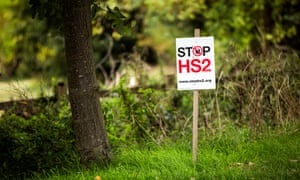A small reduction in the top speed of trains on the planned high-speed line from London to Birmingham would increase journey time but massively reduce carbon emissions and noise, independent analysts tell MPs

A small reduction in the top speed of trains on the planned high-speed line between London and Birmingham would increase journey times by just 4.5 minutes, but would massively reduce carbon emissions and noise, independent analysts have told MPs scrutinising the multibillion-pound scheme.
Research commissioned by objectors to the 117-mile HS2 line through the Chilterns shows that if trains were limited to 300 kilometres an hour rather than the proposed 360km/h, they could save hundreds of thousands of tonnes of CO2. Britain is committed to reducing emissions under UK law and the new Paris climate deal.
In addition, many communities along the route, which is eventually planned to reach northern England, would see a reduction in noise levels by up to 30% from up to 18 trains an hour , they say.
“The 23% energy saving achieved by reducing the maximum HS2 speed to 300km/h would translate to an equivalent saving in carbon emissions. HS2 Ltd’s own projections indicate that the HS2 scheme will give rise to a net carbon emission of 2.1 to 2.6m tonnes carbon dioxide equivalent over a 60-year period,” says the report by SLR Consulting and a team of experts, commissioned by the HS2 Action Alliance (HS2AA).
The total emissions could be as high as 6.5m tonnes due to underestimates, claims the report, delivered to the transport select committee on Monday.
No other country runs high-speed trains at more than 300km/h, which is now the accepted norm in China, France, Germany and Japan, the report said.
“To run trains at 300km/h would not only save energy, but reduce costs for maintenance of rolling stock and infrastructure and provide some reduction of route construction costs. A lower top speed provides significant advantages,” the report states.
HS2 Ltd has made its economic case to government by claiming that the high-speed line will lead to a significant decrease in air, car and freight travel. But the consultants, who are independent of the communities objecting, argue that their assumptions are wrong and that the true emissions of the line could be substantially greater than government has been led to believe.
Advertisement
“We believe these assumptions currently overstate the magnitude of modal shift [in transport] that will be achieved. The assumptions of HS2 are very unclear,” they say.
Acoustic experts added that trains running at more than 300km/h make disproportionate noise because aerodynamic noise becomes more influential at this speed.
“The sound energy being produced by passing trains at 300km/h [is] actually only 25% of that produced at 360km/h. This would represent a substantial benefit. A reduction in maximum design speed to 300km/h would bring about a six decibel reduction in noise level. At speeds over that, not only are overall [noise] levels higher but acoustic screening from barriers is likely to be less effective,” says the acoustic report.
A spokesman for HS2AA said: “In 2013, transport secretary Patrick McLoughlin said cutting minutes off the journey time between London and Birmingham was ‘almost irrelevant’, saying that the route was essential for Britain’s future competitive edge. If that is correct it is hard to argue against a reduction in speed so the train runs as fast as a Train à Grande Vitesse (TGV) in France.”

